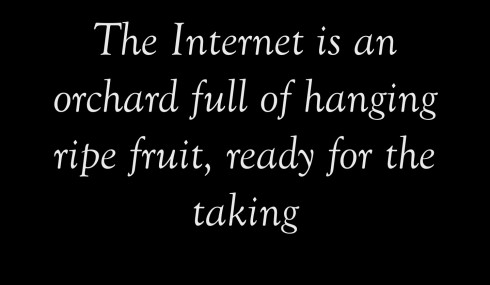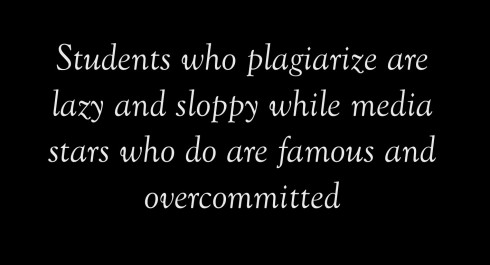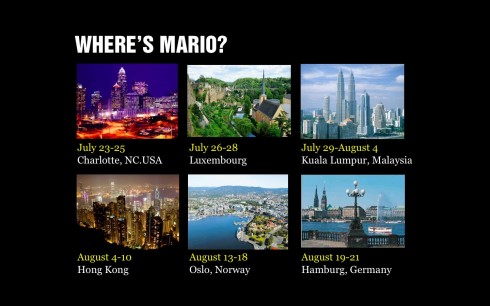TAKEAWAY: Respecting intellectual property requires commitment and a strong will to avoid the temptations of the Internet, that orchard of information with ripe fruit hanging and ready for the taking.
So Fareed Zakaria, the CNN show host and TIME columnist is back. As you may recall, Zakaria was involved in an incident of plagiarism, which he admitted publicly. It was a surprise to see Zakaria in such a predicament, as he is smart, enlightened and quite the expert on world affairs. Although he and I are sometimes not on the same page ideologically, I often derive a better comprehension of certain issues by following him.
It was another example of the ugly “p” word appearing, and involving a least likely suspect.
Not that plagiarism is new, but it is made easier by the Internet with its Macy’s style parade of millions of floats—-with more coming—-that tempt us to simply lift someone else’s intellectual property, with a minimum of effort.
Early lessons

This takes me back to one of my mentors and dearest journalism professors, Dr. Arthur “Sandy” M. Sanderson, at the University of South Florida. Anyone who took his Advanced Editing 301 class remembers the old professor’s famous words on the subject: Localize, don’t plagiarize.
If you failed to remember this, you would be penalized. Dr. Sanderson would spend considerable class time reading over our papers. When he spotted what he thought to be a plagiarized, not attributed statement, he would read the paper out loud, compare the prose of the student with that of the paragraph lifted, establish the evidence, and, without mentioning the name of the culprit, would look at all of us with a firm gaze. Usually, the student who committed the “p” sin would sink a little in his/her chair, and we all knew who had trespassed that day.
You also knew that, even if tempted, you would never engage in any “p” activities ever again.
Google on heels

A few years later, in graduate schools, while completing my doctoral dissertation at the University of Miami, it was the good and patient Dr. Randolph, my advisor, who would make sure that we did not use any statements without proper attribution. The title of my dissertation was Pedagogical Bibliography of Literary Naturalism—-definitely not a journalistic subject, and very much one dealing with comparative literature of the late 19th Century.
Mind you, it was the days of Google on heels: you walked the library for months, often collapsing to the floor with exhaustion, where you would sit down, legs folded, in those well carpeted corridors up on a high floor of the UM Library, between shelves that housed thousands of books. From time to time, serendipity would seduce you, as you discovered a fascinating book that you were not looking for, and you would stop to read if for 15 minutes that YOU did not have.
Then, as another dissertation chapter was completed, you would sit down with the courteous, bookish and never too excited Dr. Randolph, who would question every statement for attribution.
The idea of NOT stealing someone else’s intellectual property was cemented in our brains every step of the way.
As I became a professor myself at both Syracuse University and at the University of South Florida, it was I who would be reading tons of student prose in those end of the semester papers (God reserves a special place in heaven for weary college professors who have read it and seen it all!. If He doesn’t, he should!), there would always be the lazy, unscrupulous students who thought you had not read even the most essential material in your own field, and would pass the ideas of someone I sometimes even knew personally as their own.
My solution was simple: I would stop reading the paper immediately, and arrange for a conference with the student. Part of the catharsis that followed for the student would involve some level of personal embarrassment, so that he/she would never consider stealing the work of others ever again.
As I remember, my students who plagiarized tended to be the lazy and sloppy who would probably never amount to much, anyway.
Today, those who plagiarize tend to be those who did become something, as in famous and overcommitted.
Swimming in a sea of temptation
For any of us who write a blog daily, the exercise is like a sort of gymnastics. As David Carr, of The New York Times, has written in a superb commentary about the state of plagiarism today, “…columnists are in part human aggregators — everything written here reflects something that came before it”.
We read something interesting, then decide that it would be good for our own readers to benefit from that information. In the process, we must not forget who had the original idea, then we give it our own twist——as in “localize, don’t plagiarize”. The original source must be mentioned and proper credit given.
And so, as I witnessed the return of the affable and always insightful Fareed Zakaria, I welcomed him back, but, I admit, things will never be the same between the famed TV journalist and me. At least for the immediate future, I will always wonder if all that he is saying or writing about is his own material.
It is a high price for someone of his standing to pay, but maybe not enough.
Of related interest
Don’t miss this insightful piece on the subject of plagiarism by The New York Times’ David Carr:
Journalists Dancing on the Edge of Truth
http://www.nytimes.com/2012/08/20/business/media/journalists-plagiarism-
Time, CNN reinstate Fareed Zakaria after plagiarism investigations
http://www.poynter.org/latest-news/mediawire/185400/time-fareed-zakarias-plagiarism-was-unintentional-isolated-incident/
Of interest today
– USA: At Rural Newspapers, Some Publishers Still Resist Moving Online
http://www.pbs.org/mediashift/2012/08/at-rural-newspapers-some-publishers-still-resist-moving-online234.html
– UK: The Guardian Gets 2.1% Conversion on iPad Trials: What’s Working and What’s Not
http://paywall-times.com/index.php/the-guardian-gets-2-1-conversion-on-ipad-trials-whats-working-and-whats-not/
– Paywalls: A viable option or an obstacle in the way of staying informed?
http://mediaupdate.co.za/?IDStory=48793
– Bloomberg Businessweek goes magazine-y on the iPhone
http://www.niemanlab.org/2012/04/bloomberg-businessweek-goes-magazine-y-on-the-iphone/
– The newsonomics of small things
http://www.niemanlab.org/2012/04/the-newsonomics-of-small-things/
SPD: Speaker Series Begins with “News You Can Use”

(Joe Zeff Design Illustration, courtesy of SPD)
Tickets are now available for the Society of Publication Designers’ first Speaker Series event of the fall, “News You Can Use,” scheduled Sept. 10.
For more information:
http://www.spd.org/2012/08/speaker-series-begins-with-new.php
SND Scandinavia Space 2012 conference
Still time to get a spot to attend the SNDS conference in Copenhagen, Sept. 27-29;
For more information:
SNDS workshop ever. Read all about SPACE 2012 here:
The iPad Design Lab: Storytelling in the Age of the Tablet

Video walkthrough of the iPad prototype of iPad Design Lab

Mario Garcia’s upcoming speaking engagements:

WAN-IFRA World Editors Forum, Kiev, Ukraine, Sept. 2-5
http://www.wan-ifra.org/events/64th-world-newspaper-congress-19th-world-editors-forum
Cumbre Mundial de Diseño en Prensa 2012: Mexico City; September 24-26
http://www.cmdprensa.com/mx2012/
SND (Society of News Design) Cleveland; Oct. 11-13
http://cle.snd.org/